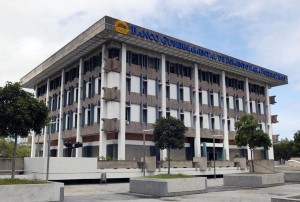S&P cuts Puerto Rico’s GO bonds to ‘B’ from ‘BB’


The GDB’s constrained fiscal situation is one of the elements considered in the downgrade. (Credit: © Mauricio Pascual)
Standard & Poor’s Ratings Services pushed Puerto Rico’s general obligation rating further into junk Thursday when it lowered it ‘B’ from ‘BB,’ with a negative outlook.
The agency attributed its decision to commonwealth’s precarious liquidity situation, saying that if “it deteriorates in the next year, possibly due to an inability to place cash flow notes, or a widening fiscal 2015 deficit, we could lower our GO and associated ratings on Puerto Rico.”
The agency also lowered the ratings for the Puerto Rico Sales Tax Financing Corp.’s (known as COFINA in Spanish) first-lien sales tax bonds to ‘B’ from ‘BBB’; COFINA’s second-lien sales tax bonds to ‘B’ from ‘BBB-‘; Puerto Rico Municipal Finance Agency’s, the Puerto Rico Employees Retirement System’s, and the commonwealth’s general fund-supported appropriation and moral obligation bonds to ‘B’ from ‘BB-‘; and Puerto Rico Infrastructure Financing Authority’s (rum tax) and the Puerto Rico Convention Center District Authority’s (hotel tax) debt to ‘B’ from ‘BB’.
Standard & Poor’s rating on the Puerto Rico Highways and Transportation Authority (HTA) is unchanged at ‘B’. The outlook on all ratings is negative.
“We believe Puerto Rico’s current economic and financial trajectory is now more susceptible to adverse financial, economic, and market conditions that could ultimately impair the commonwealth’s ability to fund services and its debt commitments,” said the agency’s Primary Credit Analyst, David Hitchcock, who drafted the report..
“Persistent economic weakness over many years has contributed to declining revenue and fiscal imbalance. Under revolving leadership, the government’s response to the situation has vacillated between rounds of spending austerity and tax cuts, or increased taxes and limited layoffs, but in either case it has relied on debt issuance to cover operating deficits,” he said.
Over time, this has led to high debt levels, which have become harder to sustain because of continued economic weakness has reduced tax resources.
“In our view, Puerto Rico’s focus more recently has turned to new rounds of financing to simply maintain critical levels of operating cash, while paying a steep price for acquiring new financing,” he noted, referring to bond yields topping 10 percent.
“All of this poses a threat, in our view, to the commonwealth’s ability to continue providing basic governmental services. We have observed in other jurisdictions that such an environment can easily give way to political and policy instability,” he said.
In the report, S&P said it had lowered COFINA’s rating based on its belief that the introduction of a new value-added tax “will create increased uncertainty as to the timing of receipts of pledged revenues and whether bond covenants separating the tax revenue from that of the commonwealth may be maintained.”
Puerto Rico’s access to cash flow financing necessary for the next fiscal year could be severely constrained, S&P said. For the current fiscal year ending June 30, 2015, Puerto Rico has arranged for more than $1 billion in total of cash flow financing, “which we expect to provide sufficient liquidity through the end of the current fiscal year based on current cash flow estimates provided by the commonwealth.”
Still, the analyst said liquidity pressures will mount in 2016 because of the Government Development Bank’s impaired fiscal situation.
VAT effects questioned
Hitchcock also put into question the effects the imposition of a VAT would have, if approved, on the island’s economy.
“Puerto Rico’s intention in imposing a VAT is to significantly raise overall revenues and create a more equitable tax system that reduces tax evasion, compared with the sales tax it would replace,” he said. “We believe there is implementation risk in the near term, if the new tax structure is approved, due to the lack of collection history and the uncertainty of collection mechanics. We also believe that it could increase forecasting volatility.”
“While on a long-term basis, higher taxes could improve the budget balance, we have concerns for the potential negative economic implications that could result from the new tax,” he further noted.
“When the current sales tax went into effect, the commonwealth expected to increase revenues and reduce tax evasion. However, actual sales tax growth fell short of original projections and compliance remains an issue,” he said. “We are concerned that similar unexpected consequences could arise from implementation of the VAT.”
If approved, it would be the first time a VAT was implemented within the U.S. governmental system.
GDB ‘disappointed’
Following S&P’s credit downgrade, GDB President Melba Acosta defended the proposed tax reform that includes the imposition of the VAT, saying that it not only strengthens the security of the COFINA bonds but all General Fund related credits.
Moreover, the proposed reform will increase revenues through a more equitable tax structure and effective tax collection mechanism.
“We are disappointed that S&P has taken such action without evaluating the details and structure of the proposed tax reform,” she said.
“COFINA bonds will continue to receive a pledged portion of the proposed VAT tax, while the structure, security and payment system remain unchanged pursuant to the fulfillment of COFINA obligations,” Acosta said.
Notably, the revenue stream attached to COFINA bonds remains separate and apart from the Commonwealth and will only further increase under the proposed VAT tax with the expected increase in the tax base, she said.
“To that end, we will continue to operate in accordance with COFINA bond covenants while the bond trustee will continue to be provided with written confirmation that all pledged revenues for COFINA bonds have been satisfied pursuant to the bond covenants and guarantees,” Acosta noted. “Moreover, we intend to provide third party legal opinions with respect to compliance with COFINA’s covenants under the bond documents.”











